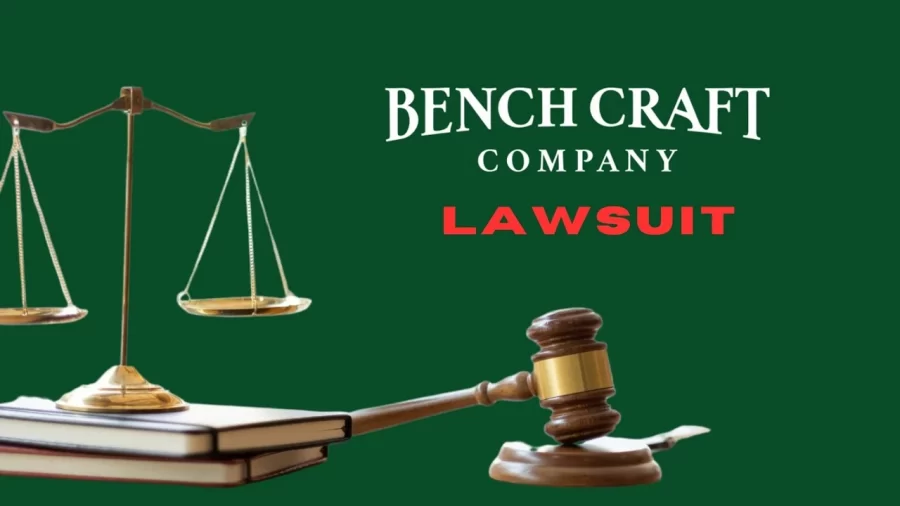There’s been a lot of talk about Bench Craft Company Lawsuit. They’re accused of using tricky marketing and unfair business practices related to golf course advertising. Let’s explore the Bench Craft Company lawsuit, including its allegations, industry impact, key players, legal phases, negotiation stages, and how it affects consumers.
What is Bench Craft Company Lawsuit?
The Bench Craft Company lawsuit is a class-action lawsuit was filed in 2018 against Bench Craft Company by a group of golf course owners and operators.
The lawsuit claims that Bench Craft Company was involved in deceptive marketing and unfair business practices.
The lawsuit specifically claims that Bench Craft:
- The lawsuit accuses Bench Craft of misrepresenting the potential audience for its advertising, causing businesses to invest based on inflated projections.
- The lawsuit alleges that Bench Craft used high-pressure sales tactics and deceptive contracts to trap businesses into long-term agreements.
- The lawsuit contends that Bench Craft failed to fulfill its promises of providing businesses with advertising and marketing services.
- The lawsuit asserts that Bench Craft charged businesses for services they either did not receive or did not require.
While the Bench Craft Company has denied all the allegations in the lawsuit, the legal proceedings are ongoing. The outcome could have substantial consequences for both the company and the broader golf industry.
History Behind Bench Craft Company Lawsuit
The Bench Craft Company lawsuit has been a widely discussed topic. Before delving into the legal details, let’s explore the company itself. Established in 1982 by William J. McHugh Sr., the company has decades of history. Initially, their services were limited.
Initially showcasing expertise in golf course signs and printed advertisements in golf course books, Bench Craft Company expanded its focus over time. They began targeting start-ups, small-scale businesses, and other advertisers, offering a range of advertising services.
The business operates straightforwardly, with golf clubs signing off on business contracts. Smaller companies’ advertisements are then presented to regular golfers through yardage books, scoreboards, and guides.
The lawsuit began when fraudulent contracts were signed, involving deceptive tactics and promises of enhanced advertising for companies’ services to the targeted population.
What are The Allegations On Bench Craft Company?
What caused a business company’s downfall? Fraudulent practices and deceitful actions. Here are some accusations as a result of the Bench Craft company lawsuit:
- What do clients want the most? Timely services. Bench Craft faced accusations of failing to deliver advertisements to clients on time. Some advertisers even claimed that their work wasn’t initiated, and others reported that their designed advertisements didn’t reach the intended target audience.
- Indeed, some startup companies signed contracts with Bench Craft that were deemed unfair and biased, significantly favoring the company to the dismay of its clients.Isn’t it just apathetic?
- Clients also made allegations that they were misled about the sale of services. They claimed that Bench Craft provided false information about the effectiveness of advertising services and concealed crucial contract terms.
Marketers and consumers have expressed concern about this business misconduct, urging for fair resolution and handling of the situation.
What are The Key Players Involved In Bench Craft Company Lawsuit
To better understand the Bench Craft company lawsuit, let’s begin by examining the key parties involved:
Disputants
The main parties involved include claimants and business contractors who entered legal contracts with Bench Craft, alleging fraudulent services. They have asserted financial losses and damage to their reputation due to the company, leading them to file a lawsuit against Bench Craft.
Bench Craft Company
On the other side, the respondents are accused of business misconduct and violating contractual conditions with their clients.
Attorneys
In this legal battle, both the claimants and respondents engage attorneys and legal representatives to advocate for their respective cases. These legal professionals play a crucial role in the ongoing dispute.
What are The Key Phases of Bench Craft Company Lawsuit
The Bench Craft company lawsuit has undergone significant phases in recent years, attracting substantial backlash.
Class-Action Lawsuit
The company lawsuit transformed into a class-action suit when a considerable number of plaintiffs united against the company’s misconduct, collectively voicing their grievances. This collective action has had a substantial impact on those affected.
Company’s Defence
In response to accusations of misleading conduct and deception, Bench Craft released a defense statement asserting the value and authenticity of its advertising services.
Furthermore, Bench Craft claimed that any conflicts arising from market fluctuations and other factors were natural occurrences, and the company had no direct involvement in those matters.
Settlements Discussions
Faced with a tarnished reputation, the company chose the path of least resistance, opting to settle rather than endure a prolonged and arduous trial. The decision to negotiate and resolve aimed at avoiding extensive legal expenses.
This extended legal battle has spanned several years with complex consequences, but there is an anticipation that the issues will be resolved soon.
How Bench Craft Company Lawsuit Is Negotiated?
Negotiations arose when one or both parties sought to avoid formal trials. They established conditions and resolved the matter independently. A mediator facilitated a settlement to compensate for the losses incurred by either party.
Limited information on the negotiations in the Bench Craft company lawsuit has led to speculation, leaving many details unclear.
Did the Negotiations fail? The chances of the negotiations not working out are greater because the case is still moving forward, and the judge hasn’t given a final decision yet.
What is The Impact On Industries & Consumers?
The Bench Craft company lawsuit didn’t just impact industries; it also affected consumers. The company’s reputation was damaged, leading businesses that once relied on it to sever ties and reconsider their marketing strategies.
The lawsuit prompted companies to become more cautious in evaluating unsuccessful advertising campaigns. Bench Craft’s credibility was questioned, resulting in the loss of clients who sought alternatives from different advertising companies.
The lawsuit not only made clients more cautious but also compelled other companies to enhance transparency and communication about their services. This shift aimed to prevent misconduct and fraud in the industry.
When a company faces penalties or legal consequences, industries tend to prioritize ethical practices and strive for increased transparency.
FAQs on Bench Craft Company Lawsuit
Q1. Is Bench Craft Company still operating during the lawsuit?
A. Yes, the company is still functioning, but its business activities have been impacted, resulting in the loss of numerous clients.
Q2. How can local businesses protect themselves from similar disputes?
A. They can carefully review their business contracts and seek legal advice.
Q3. What can consumers learn from this lawsuit?
A. It’s crucial for them to be cautious when dealing with marketing advertisers and carefully read contracts to avoid any involvement in fraudulent services.
Conclusion
The Bench Craft Company lawsuit holds importance with potential far-reaching effects on the golf industry. A successful outcome might bring about changes in how golf course advertising companies conduct business. Moreover, it could serve as a warning to other businesses that unfair practices will not be accepted.
Golf course owners and operators should stay informed about the allegations in the lawsuit and take precautions to safeguard against similar tactics. Conducting thorough research, documenting everything in writing, being cautious of high-pressure sales tactics, and asking questions can help minimize the risk of falling victim to fraud.
If you think you’ve been subjected to deceptive or unfair practices by a golf course advertising company, it’s advisable to consult with an attorney to explore your legal options. You might be eligible for damages.









